Big Questions: What people want to know about kitchen tiles right now
Tile of Spain director María D Arráez answers the most popular questions about tiles to help retailers solve customers' queries
Tile of Spain director María D Arráez answers the most popular questions about kitchen tiles to help retailers solve customers’ queries

Q: What tiles are best for a kitchen floor?
A: The best tiles for a kitchen floor are those that combine quality, ease of maintenance and visual appeal.
Sponsored Video
Ceramic tiles are the perfect choice, offering an ideal balance of affordability, durability and style.
With their stain-resistant glazed surfaces and vast array of designs, they effortlessly handle the demands of a busy kitchen whilst enhancing its aesthetic appeal.
They are also low-maintenance, resistant to scratches and moisture, and simple to clean.
We would recommend textured tiles as they offer excellent safety in high-traffic and spill-prone areas, making them particularly popular in homes with kids, pets and elderly relatives present.
If your kitchen is on a smaller scale, consider diagonal patterns or large format tiles, as these can help to create a more spacious appearance.
For a warmer and natural look, try wood-look ceramic tiles, which mimic the aesthetic of hardwood with the durability and water-resistance of ceramic.
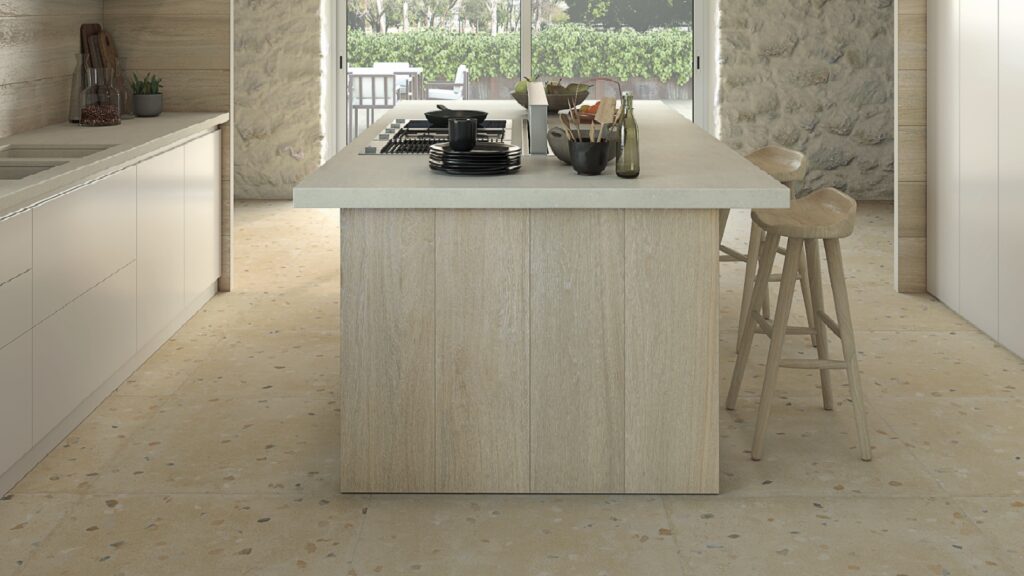
Vives Ceramica offers large format porcelain tiles, including Paris as shown on the island
Q: Are all tiles waterproof?
A: Not all tiles are waterproof but many are highly water-resistant.
Both ceramic and porcelain tiles are water resistant, thanks to their low water absorption rate, however porcelain tiles do have a particularly low rate of absorption, where water will stay on the surface of the tile, and so are often the preferred choice, in particular for floors or high-splash areas on walls.
Other tiles such as terracotta tiles, for example, have a higher water absorption rate as they are more porous, but with the right sealing and maintenance they can also be used in wet areas if needed.
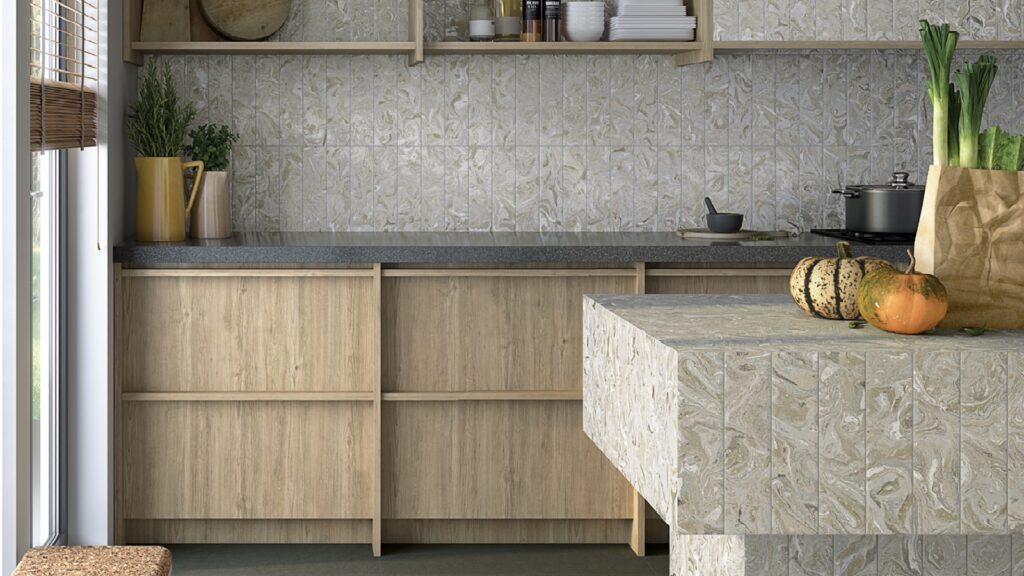
Arcana Ceramica Spuma tiles, shown in Sorbetto Frappe
Q: Are all tiles stain resistant?
A: Different types of tiles will have varying levels of durability and resistance, which is dependent on their material and finish.
Thanks to their high durability, porcelain tiles are the best stain-resistant option, as they have extremely low porosity and dense composition.
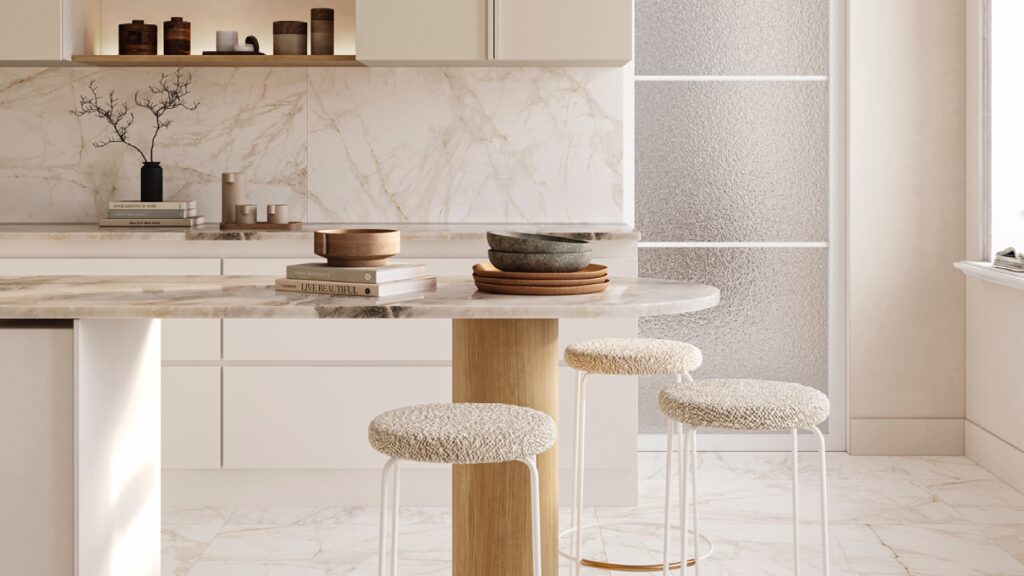
Gayafores porcelain tiles in Spider Gold
Q: Are all tiles heat resistant?
A: The level of heat-resistance depends on the material, manufacturing process and type of tile.
Porcelain tiles are the best overall choice, as they are highly-resistant to sharp temperature changes and can withstand temperatures of over 1,200 degrees.
They are fireproof and their low porosity helps to prevent expansion or cracking.
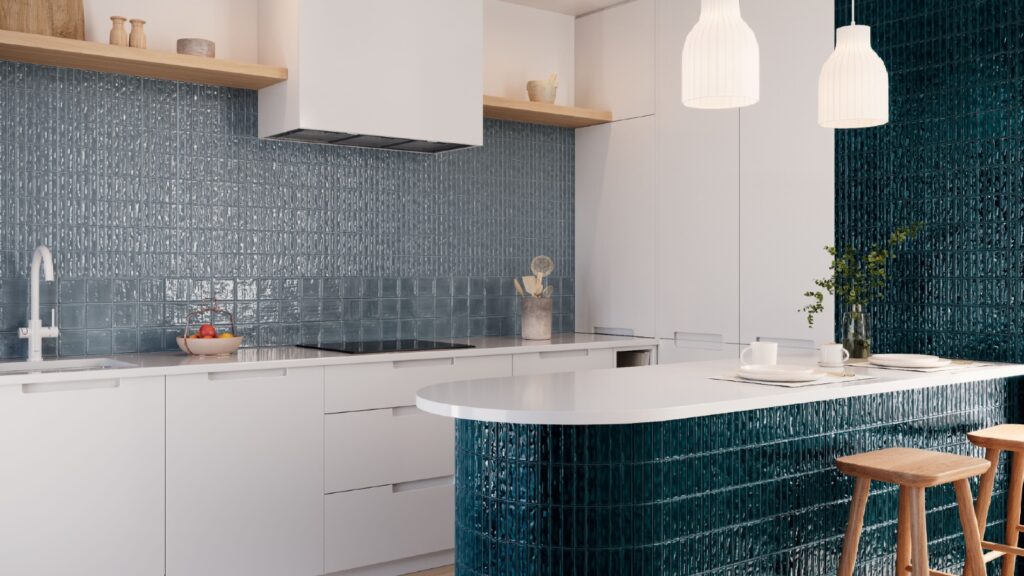
The Sticks collection from Ceramica Vilar Albaro is shown in Blue Mist on the Wall and Oil on the kitchen island
Q: What tiles are best for underfloor heating?
A: Porcelain tiles quickly conduct heat from an underfloor heating system, ensuring fast and even heat distribution.
This efficiency minimises energy consumption compared to less conductive materials, like carpet or wood.
Porcelain tiles are also durable enough to withstand the constant temperature changes without cracking or warping.
They are compatible with both electric and water-based systems and are available in a wide range of designs, sizes and finishes, offering style and functionality.
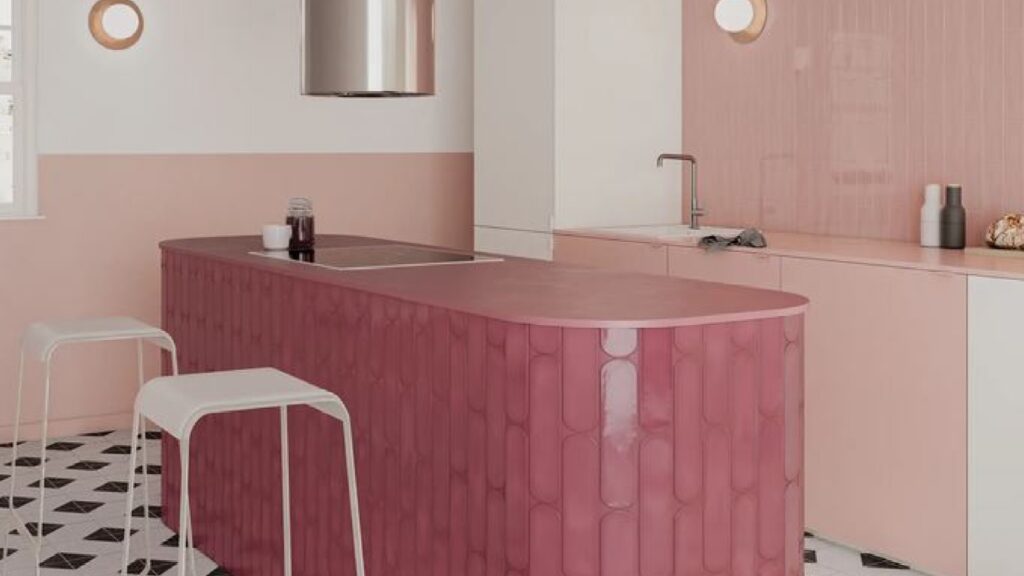
WOW Design tiles, showcasing the Drops Collection
Related Articles
#socialwall
Sintered stone manufacturer Neolith has launched Calacatta Roma and Cappadocia Sunset, inspired by nature and classical architecture, and for use in kitchens or bathrooms walls, floors, in gardens or facades.

They belong to The New Classtone and Fusioncollections which interpret marble and natural stone, respectively, and boast Neolith’s antibacterial NeolEAT technology.
Inspired by Ancient Rome, Calacatta Roma (pictured top) pays homage to Italian Carrara marble, with ochre and grey veins in a white background.
While the Cappadocia region, in central Turkey, with its rock formations formed by volcanoes and underground cities, has inspired Cappadocia Sunset (pictured below).

Just like all of Neolith’s surfaces, Calacatta Roma and Cappadocia Sunset are resistant to heat and atmospheric conditions, are 100% recyclable, and do not contain added quartz to their formulation.
Mar 14, 2024
JUST OUT: @AcquabellaBath has unveiled a choice of shower grate patterns for its Base and Arq shower trays… https://t.co/kMN83c40Qf
JUST OUT: @FrankeUK unveils Mythos single lever mixers in Swivel Spout and Pull-out Nozzle options. #kitchendesign https://t.co/TSKCAo5r0e
INTERVIEW: Sales and marketing director of @blumuk David Sanders on how the kitchen industry has changed post-pand… https://t.co/k9LIpUhhDF
NEWS: Challenging housing market is driving home improvements, finds new research by @HafeleUK #HomeImprovement… https://t.co/eMB7jludIm
NEWS: British manufacturer @kudosshowersltd acquired by European SanSwiss. #acquisition #manufacturers #bathrooms https://t.co/gpOv7jMevn
NEWS: @HafeleUK announces Richard Curtis as managing director. #newhire #appointment #leadership https://t.co/NP8U5ramOb
NEWS: @officialbikbbi names CT1 sealant manufacturer as corporate sponsor. #installation #installer https://t.co/8zsxs2HI3n
NEWS: @quookeruk named one of fastest-growing companies in North West. #business #Awards https://t.co/9zZ1ZDGrFI
RETAILER FOCUS: Managing director and design director of UK Kitchen Retailer of the Year @KitchensbyJSG Jim Geddes… https://t.co/JhL3vmxwbd
NEWS: Consumers are renovating for long term, with kitchens and bathrooms a priority, finds @HouzzUK… https://t.co/9VhoTUDI0B
PROFILE: Managing Director of Flair Showers Alan Wright talks about the relaunch of the company, creation of a Show… https://t.co/WDMPqDt2Uk
The new @blumuk carbon black LEGRABOX boasts beautifully slim drawer sides, bringing furniture onto trend, easily b… https://t.co/DrEXXWTyQb
NEWS: House of Fraser owner @FrasersGroupPLC enters strategic partnership with @ao, buying a stake in the online e… https://t.co/44N0O9bekn
NEWS: @HowdensJoinery awarded @WhichUK Best Buy for its rigid cabinets and handleless kitchens. #kitchen… https://t.co/rALz8XRHbv
NEWS: @grohe invites 800 guests from around the world to its Grohe X Professional event in Lisbon, Portugal.… https://t.co/2RGjDum980
JUST OUT: Home appliance brand Candy has unveiled the Rapido dishwasher, claimed to be the fastest and most spaciou… https://t.co/mbWn2pJp2C
Newsletter
Sign up to receive our newsletter and we’ll send you details of our latest videos, competitions and much more

